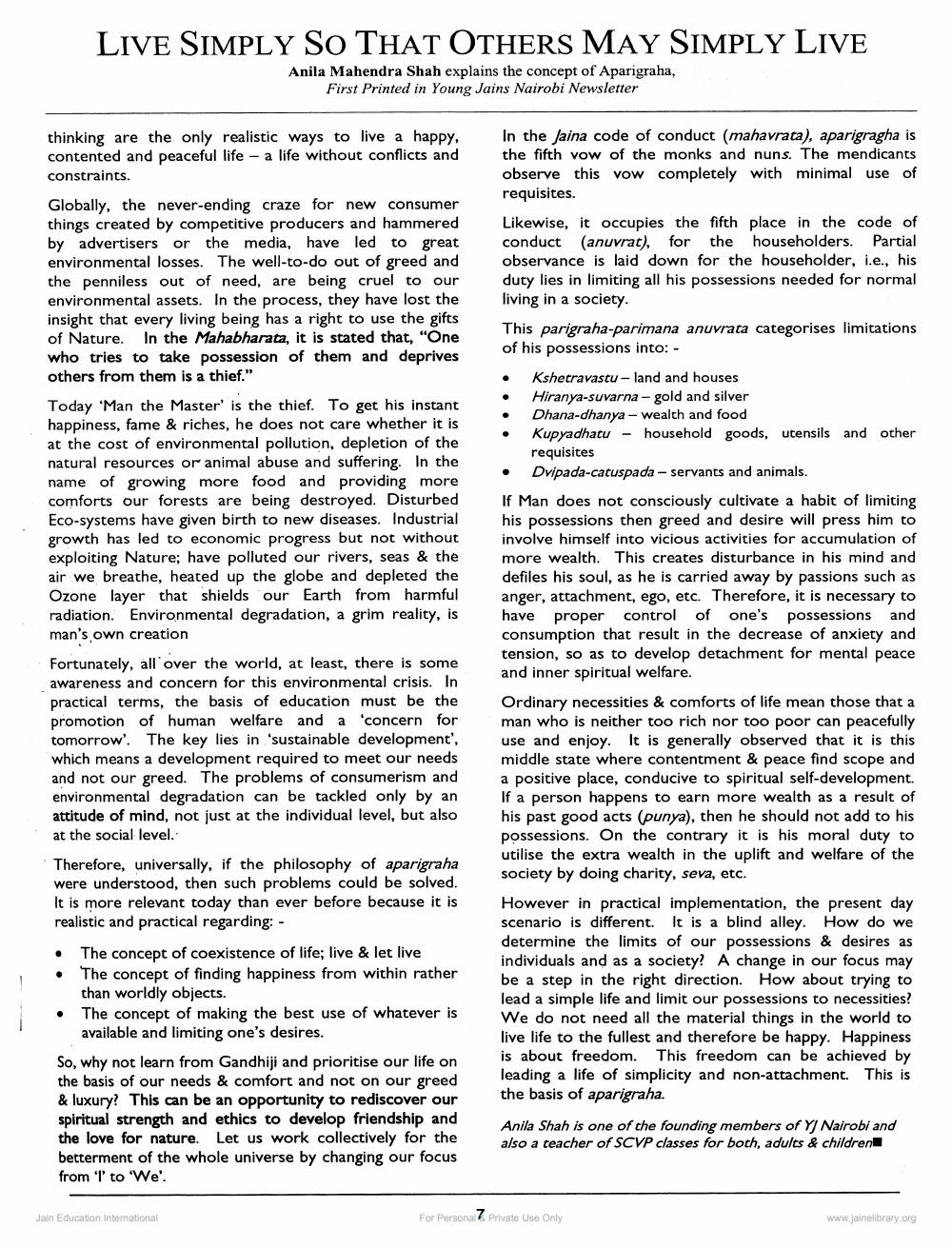Book Title: YJ International Newsletter 2004 Vol 18 No 01 Author(s): Young Jains (UK) Publisher: UK Young Jains View full book textPage 7
________________ LIVE SIMPLY SO THAT OTHERS MAY SIMPLY LIVE Anila Mahendra Shah explains the concept of Aparigraha, First Printed in Young Jains Nairobi Newsletter thinking are the only realistic ways to live a happy, contented and peaceful life - a life without conflicts and constraints. Globally, the never-ending craze for new consumer things created by competitive producers and hammered by advertisers or the media, have led to great environmental losses. The well-to-do out of greed and the penniless out of need, are being cruel to our environmental assets. In the process, they have lost the insight that every living being has a right to use the gifts of Nature. In the Mahabharata, it is stated that, "One who tries to take possession of them and deprives others from them is a thief." Today 'Man the Master' is the thief. To get his instant happiness, fame & riches, he does not care whether it is at the cost of environmental pollution, depletion of the natural resources or animal abuse and suffering. In the name of growing more food and providing more comforts our forests are being destroyed. Disturbed Eco-systems have given birth to new diseases. Industrial growth has led to economic progress but not without exploiting Nature; have polluted our rivers, seas & the air we breathe, heated up the globe and depleted the Ozone layer that shields our Earth from harmful radiation. Environmental degradation, a grim reality, is man's own creation Fortunately, all over the world, at least, there is some awareness and concern for this environmental crisis. In practical terms, the basis of education must be the promotion of human welfare and a 'concern for tomorrow'. The key lies in 'sustainable development', which means a development required to meet our needs and not our greed. The problems of consumerism and environmental degradation can be tackled only by an attitude of mind, not just at the individual level, but also at the social level. Therefore, universally, if the philosophy of aparigraha were understood, then such problems could be solved. It is more relevant today than ever before because it is realistic and practical regarding: - The concept of coexistence of life; live & let live • The concept of finding happiness from within rather than worldly objects. • The concept of making the best use of whatever is available and limiting one's desires. So, why not learn from Gandhiji and prioritise our life on the basis of our needs & comfort and not on our greed & luxury? This can be an opportunity to rediscover our spiritual strength and ethics to develop friendship and the love for nature. Let us work collectively for the betterment of the whole universe by changing our focus from 'I' to 'We'. Jain Education International In the Jaina code of conduct (mahavrata), aparigragha is the fifth vow of the monks and nuns. The mendicants observe this vow completely with minimal use of requisites. Likewise, it occupies the fifth place in the code of conduct (anuvrat), for the householders. Partial observance is laid down for the householder, i.e., his duty lies in limiting all his possessions needed for normal living in a society. This parigraha-parimana anuvrata categorises limitations of his possessions into: - Kshetravastu - land and houses Hiranya-suvarna- gold and silver Dhana-dhanya - wealth and food Kupyadhatu household goods, utensils and other requisites Dvipada-catuspada - servants and animals. If Man does not consciously cultivate a habit of limiting his possessions then greed and desire will press him to involve himself into vicious activities for accumulation of more wealth. This creates disturbance in his mind and defiles his soul, as he is carried away by passions such as anger, attachment, ego, etc. Therefore, it is necessary to have proper control of one's possessions and consumption that result in the decrease of anxiety and tension, so as to develop detachment for mental peace and inner spiritual welfare. Ordinary necessities & comforts of life mean those that a man who is neither too rich nor too poor can peacefully use and enjoy. It is generally observed that it is this middle state where contentment & peace find scope and a positive place, conducive to spiritual self-development. If a person happens to earn more wealth as a result of his past good acts (punya), then he should not add to his possessions. On the contrary it is his moral duty to utilise the extra wealth in the uplift and welfare of the society by doing charity, seva, etc. However in practical implementation, the present day scenario is different. It is a blind alley. How do we determine the limits of our possessions & desires as individuals and as a society? A change in our focus may be a step in the right direction. How about trying to lead a simple life and limit our possessions to necessities? We do not need all the material things in the world to live life to the fullest and therefore be happy. Happiness is about freedom. This freedom can be achieved by leading a life of simplicity and non-attachment. This is the basis of aparigraha. Anila Shah is one of the founding members of YJ Nairobi and also a teacher of SCVP classes for both, adults & children For Personal Private Use Only www.jainelibrary.orgPage Navigation
1 ... 5 6 7 8 9 10 11 12 13 14 15 16 17 18 19 20 21 22 23 24
